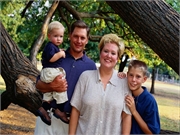- Could Your Grocery Store Meat Be Causing Recurring UTIs?
- Are You Making This Expensive Thermostat Error This Winter?
- Recognizing the Signs of Hypothyroidism
- 10 Strategies to Overcome Insomnia
- Could Artificial Sweeteners Be Aging the Brain Faster?
- Techniques for Soothing Your Nervous System
- Does the Water in Your House Smell Funny? Here’s Why
- Can a Daily Dose of Apple Cider Vinegar Actually Aid Weight Loss?
- 6 Health Beverages That Can Actually Spike Your Blood Sugar
- Treatment Options for Social Anxiety Disorder
Child’s Cancer Doesn’t Raise Parents’ Divorce Risk, Curb Plans for More Kids: Study

Having a child with cancer doesn’t appear to affect parents’ risk of splitting up or their plans to have more kids.
That’s the conclusion of a Danish study that compared more than 12,400 parents of children diagnosed with cancer between 1982 and 2014 to nearly 70,000 parents whose kids were cancer-free.
Parents were followed until 10 years after a child’s cancer diagnosis — or until their separation, divorce, death, emigration or the end of 2017, whichever came first.
Overall, parents of children with cancer had a 4% lower risk of separation and 8% lower risk of divorce than the other parents, the study found.
For parents of kids with cancer, those who were younger, had less education or were unemployed were more likely to separate or divorce. The risk was also higher for couples whose child was diagnosed at a younger age.
Researchers also found that a child’s cancer diagnosis did not affect the parents’ family planning, according to the study published online May 25 in the journal Cancer.
Childhood cancer can cause fear and uncertainty for parents, who also have to deal with many challenges in caregiving, work and other aspects of daily life, the researchers noted.
Health care providers should offer parents these reassuring findings, along with support if needed to improve family life over the long term, said study author Luzius Mader, a postdoctoral research fellow at the Danish Cancer Society Research Center in Copenhagen.
“Currently, family support services are largely limited to the child’s in-patient treatment including support by hospital staff such as social workers or psycho-oncologists as well as through community organizations,” he said in a journal news release. “However, while more general support services such as marital counseling are widely available, cancer-specific family support services are often lacking after the child’s treatment.”
More information
The U.S. National Cancer Institute offers a guide for parents of children with cancer.
Source: HealthDay
Copyright © 2026 HealthDay. All rights reserved.










